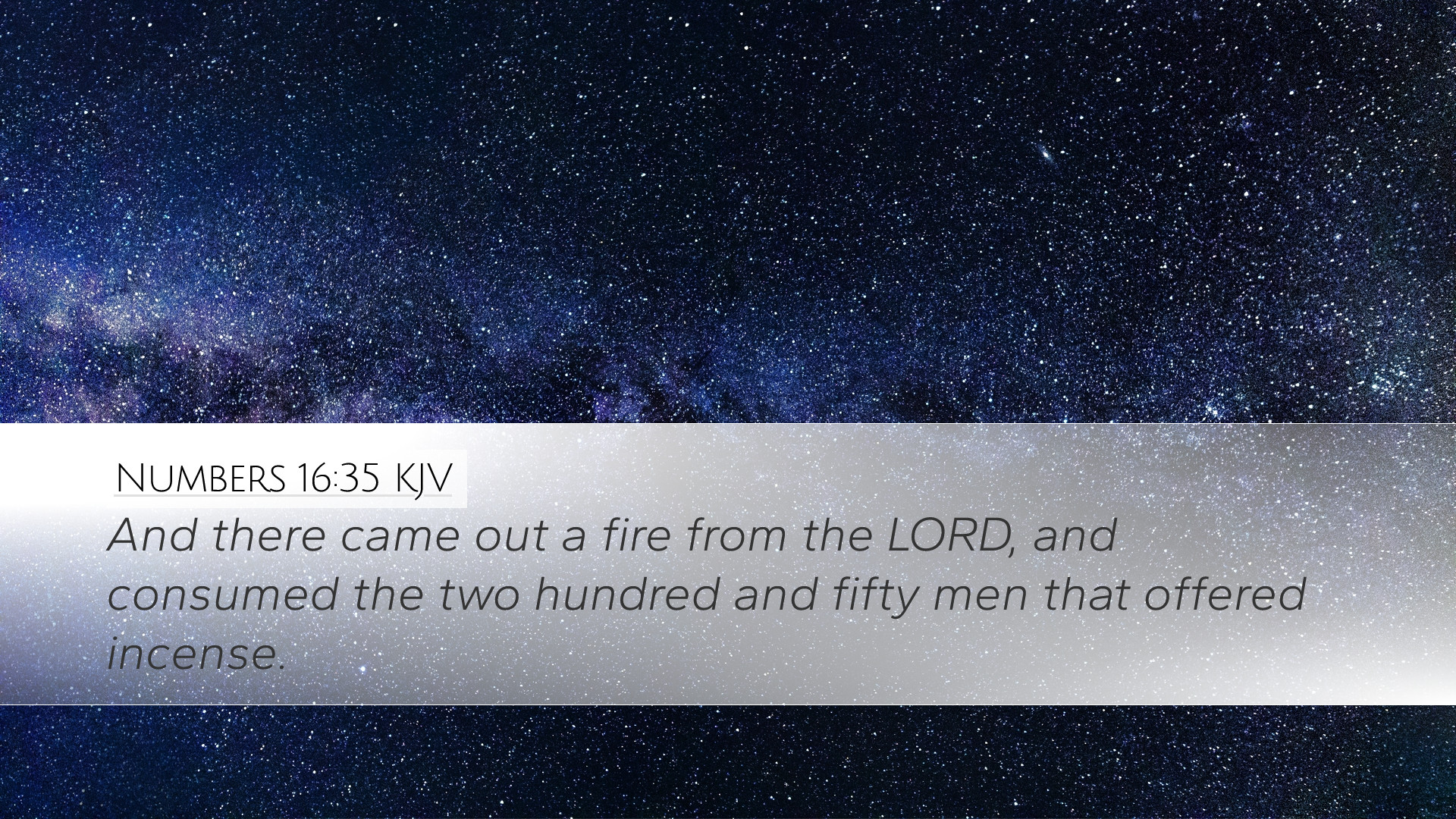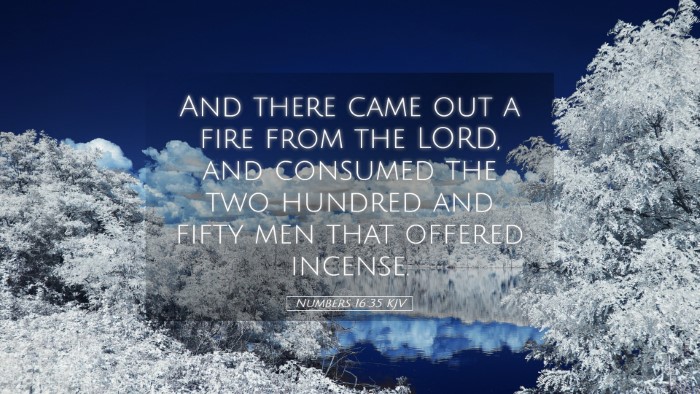Commentary on Numbers 16:35
Numbers 16:35 states: "And there came out a fire from the LORD, and consumed the two hundred and fifty men that offered incense." This verse serves as a critical moment in the narrative of the Israelites, marking the divine judgment upon Korah and his followers. The following commentary synthesizes insights from various public domain sources.
Contextual Background
The events leading up to this verse are significant in understanding its implications. Korah, a Levite, instigated a rebellion against Moses and Aaron, challenging their leadership and the unique calling of the priesthood (Numbers 16:1-3). This rebellion reflects a deeper struggle against God’s appointed order. The dramatic consequences that follow underscore the seriousness of opposing divine authority.
Divine Judgment
The phrase "And there came out a fire from the LORD" signifies not only God's immediate reaction to the insurrection but also His holy presence and power. According to Matthew Henry, this fire symbolizes divine judgment manifesting in a tangible form, revealing God's willingness to protect His chosen leaders and uphold His commandments. The consumption of the 250 men who offered incense emphasizes the gravity of unauthorized worship and the sanctity of the priestly office.
Rebellion and Its Consequences
Albert Barnes elaborates on the theme of rebellion against God. He posits that the act of offering incense was restricted to Aaron and his descendants, and the willingness of these men to usurp this role reflects a broader attitude of defiance against God’s order. Their rebellion resulted in a catastrophic demonstration of God's holiness, serving as a warning against presumption in spiritual matters.
Symbolism of Fire
Fire, as a symbol of God’s judgment, recurs throughout Scripture. It represents both purification and destruction. Adam Clarke points out that fire often signifies God’s presence (Exodus 3:2, 1 Kings 18:38), and in this instance, it communicates the seriousness with which God regards worship. The consumption of those who presumed to come before Him reveals that God demands holiness and reverence, a theme critical not only in the Old Testament but throughout the entirety of Scripture.
Theological Implications
This incident serves as an illustration of the holiness of God and the consequences of violating His commandments. Theological reflections from these commentaries suggest several important lessons:
- Authority and Accountability: God's chosen leaders are accountable to Him and the responsibilities that accompany their calling entail reverence and awe.
- Worship in Spirit and Truth: Unacceptable forms of worship lead to dire consequences, stressing the necessity for adhering to God’s prescribed methods of worship.
- Judgment as a Divine Response: God’s responses, while loving and patient, show that He will not overlook sin, particularly when it undermines His established order.
The Role of Leadership
The fate of Korah's followers adds an additional layer to our understanding of spiritual leadership. The responsibility of leaders within the church today is more relevant than ever, calling for humility and submission to God’s will. Pastors and theologians must study this passage as a reminder of the weightiness of their responsibilities, lest they incite God’s judgement through reckless leadership.
Application for Today
For modern Christians, Numbers 16:35 is a powerful reminder of God’s holiness and the seriousness of spiritual authority. Pastors, students, and scholars should approach their respective ministries with a profound awareness of their accountability to God.
- Personal Reflection: How do I view the authority of leadership in my community? Am I respectful and supportive of God’s chosen leaders?
- Corporate Worship: Are our worship practices aligned with God’s requirements as revealed in Scripture?
- Holiness and Fear of God: Do I hold a proper reverence for the holiness of God in my daily life and in corporate settings?
Conclusion
Numbers 16:35 serves as a powerful testament to the seriousness of divine judgment against rebellion and illicit worship. The judgment upon Korah and his followers illustrates not only God’s commitment to order within His people but also His unwavering holiness. As we reflect upon this passage, may we cultivate a heart of reverence for God’s authority in every aspect of our lives and ministries, ensuring that our worship and service align with His divine will.


